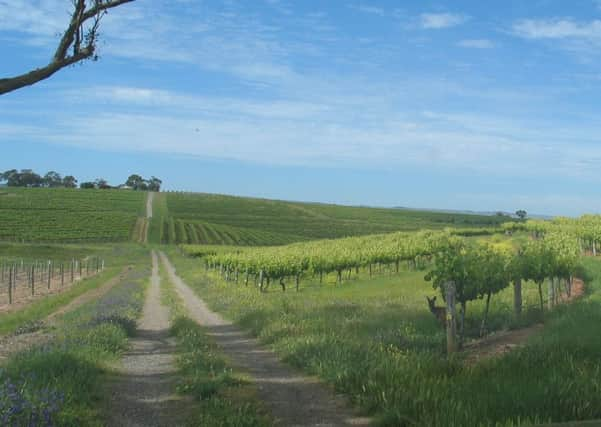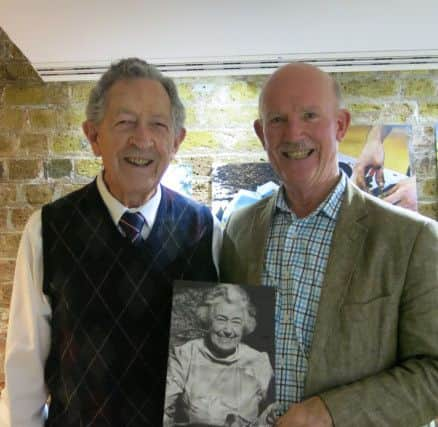Why big doesn't necessarily mean bad whne it comes to wine producers


Just when I think I have established some fairly sensible guidelines about wine – such as the fact that big companies are generally less personable than small ones and Australian Chardonnay is fine, but really doesn’t age well – someone comes along and throws them out of the window.
The someone in this case is Eileen Hardy – no longer with us, but apparently a redoubtable lady, who took over running the Australian family wine company, Hardys, when she was widowed in 1938. She is remembered in a range of top quality wines from the Hardy family and I was invited to taste 30 years of the Eileen Hardy Chardonnay, from its first vintage in 1986. Not only were the wines there, but so were members of her family. Her son, Sir James Hardy, at a sprightly 84, hosted proceedings and was helped by Bill Hardy, her grandson, who, when he isn’t acting as a brand ambassador, seems to spend his time walking around Britain. He completed the coast-to-coast walk recently, but because of time pressures with the job he had to do it in stages. True to the tradition of the walk, he picked up a pebble from the Irish Sea at the start and carried it for 192 miles before dropping it into Robin Hood’s Bay at the end of the walk. Since the pebble made several flights to Australia during that period it must have been the most travelled pebble on the beach.
Advertisement
Hide AdAdvertisement
Hide AdAn additional Hardy, Bill’s daughter Alex, has joined the business, making her the sixth generation of the family to work in wine. None of this would be remarkable apart from the fact that Hardys is no longer a family company. It was sold in a series of takeovers starting in 1992 and is now part of one of the largest wine companies in the world. Yet there is a thread of family history leading back to Thomas Hardy (apparently no relation to the author) who left Devon in 1850 with £20 in his pocket and who went on to found one of Australia’s most successful wine companies. Now based in McLaren Vale, south of Adelaide, and with vineyards and grape contracts across the continent, Hardys has the ability to create a whole range of wines, from good value Nottage Hill to top-of-the-range Eileen Hardy and a sparkling wine, modestly named Sir James.


Chardonnay is now famous around the world but back in 1986 it was a relatively new variety. Although it was the mainstay of white Burgundy, it hadn’t achieved the global fame that it now has and Hardys was among the first to plant it in Australia, selecting Padthaway, south of Adelaide, as a suitably cool region.
At the time, Tom Newton was just starting out in his winemaking job at Hardys, and surprisingly he is still there, elevated to chief winemaker for white wines and clearly someone who has had a steady hand on the style of the wines for decades. “What I like about Chardonnay is that it acts like a canvas,” he said when the bottles were opened and the first flight was being poured. “It responds to different sites with a different balance of fruit, acidity and intensity.”
The first vintage, 1986, was astonishing. Still lively, with clear matured notes of tangerine peel, honey and nuts, it was certainly still drinkable. Moving on to 1987, still from Padthaway, there was a freshness of style with peach and lemon notes. By 1989 Hardys had started to do some of the fermentation in barrel, adding a silky texture to the profile, which built up over the next few years. The 1992 vintage showed the increasing Australian enthusiasm for oak, but by now a new grape area, Yarra, was being investigated. The Yarra Valley, in Victoria, 800km from Adelaide, is definitely cool and 20 per cent Yarra fruit added another brighter dimension that became even more precise and vibrant in 1995, with additions from the Adelaide Hills.
Advertisement
Hide AdAdvertisement
Hide AdAs the years went on Hardys sought other grape profiles, from premium regions such as Canberra and Tumbarumba, each variation adding another layer of complexity.


As winemaker Tom said:, “We were looking for more drinkability and complexity, to get away from the heavier styles of Chardonnay and build up layers of flavour elements from grape sourcing, winemaking and ageing to give a more complex and elegant wine.”
Tasmania was the real discovery. Starting at a tentative 15 per cent addition from this definitely cool island in 1999, it leapt to 65 per cent, then dropped a bit and stayed at around 50 per cent for several years.
“Tasmania fruit adds a juicy character that we couldn’t get from anywhere else,” said Tom. The level of oak was dropping too, moving from small barriques to larger puncheons, allowing the ageing process to continue without adding so much oak flavour.
Advertisement
Hide AdAdvertisement
Hide AdAs the vintages continued the wines were refined. There was a brief experiment with Western Australia fruit but by gradually sourcing new clones and sources of Chardonnay and focusing the winemaking process on retaining freshness, Hardys has arrived at the current vintage, 2014, a lively wine, with white peach fruit, a mouth-filling texture and elegance. Currently available at £25.99 (Waitrose Cellar), it doesn’t shout its Australian heritage, nor does it hide it, but would be quite comfortable alongside any stylish dinner party.
The whole exercise behind this tasting was not to promote a particular wine, but to demonstrate that Australian Chardonnay has come of age. It started out brash, a little gawky and while early samples of Eileen Hardy have aged well, the wine has now acquired a smoothness, elegance and ability to age that makes it supremely food friendly.
They make only 2,000 cases of Eileen Hardy Chardonnay and a lot of it gets sold in Asia, but the UK gets a fair allocation. Now that Hardys is sponsoring English cricket, the senior Hardy family members are frequently to be found at Lord’s, glass in hand, although it is quite difficult to find out which side they are cheering on.